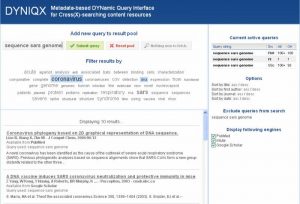News Story
DYNIQX Rocqx! (where Google can’t reach)
Wednesday 21 Nov 2007
KMi has completed the first test phase of DYNIQX, an innovative search tool that pools results from multiple search engines, including academic repository sites that Google does not index. Unlike earlier ‘meta-search’ engines, DYNIQX uses a dynamic interface to add and remove results in real time as the user ‘tunes’ the query, thereby making the overall experience better, faster, and more relevant than any of the individual tools.
At least, that’s the ambition: the tool, designed by the 3-man DYNIQX team in KMi (Cristi Barladeanu, Jianhan Zhu, and Marc Eisenstadt), was implemented by Cristi Barladeanu while on a short break from his undergraduate studies at Alexandru Ioan Cuza University in Romania, and is now undergoing extensive user testing as part of Jianhan Zhu’s evaluation work. The forthcoming version will also integrate Dr. Zhu’s Expert Search engine to help rank order the relevance of named individuals identified during the query interactions.
Early testing shows that DYNIQX was preferred to Google Scholar, Intute, and PubMed (dedicated repository searches), although the sample of experimental subjects was too small to be statistically significant. Nevertheless, future testing will take place on a larger scale, deploying a custom monitoring and testing suite developed by the same team.
The project sponsors, JISC, along with project partners University of Manchester and Herriot-Watt University, have expressed enthusiasm about the results of the 6-month project, and are in discussion about extending the work.
And the name, ‘DYNIQX’? It was generated to satisfy 4 constraints: (i) it had to have ‘dyn’ at the beginning to emphasise the dynamic query interface; (ii) it had to be an acronym for the other elements of the work (Queries, Cross-site searching); (iii) it had to be unique, in that it had to have precisely ZERO hits on Google search (which was true on the day it was devised, in mid-2007); (iv) it had to look like we paid a 1990’s car advertising consultant $250,000 to think up an unpronounceable name. Just kidding about (iv). The hardest constraint was actually (iii).
Related Links:
Latest News
KMi at the Palace of Westminster: Exploring Blockchain for Society and Economy
OUAnalyse at the Digital Ethics Summit 2025: Advancing Responsible AI in Education

